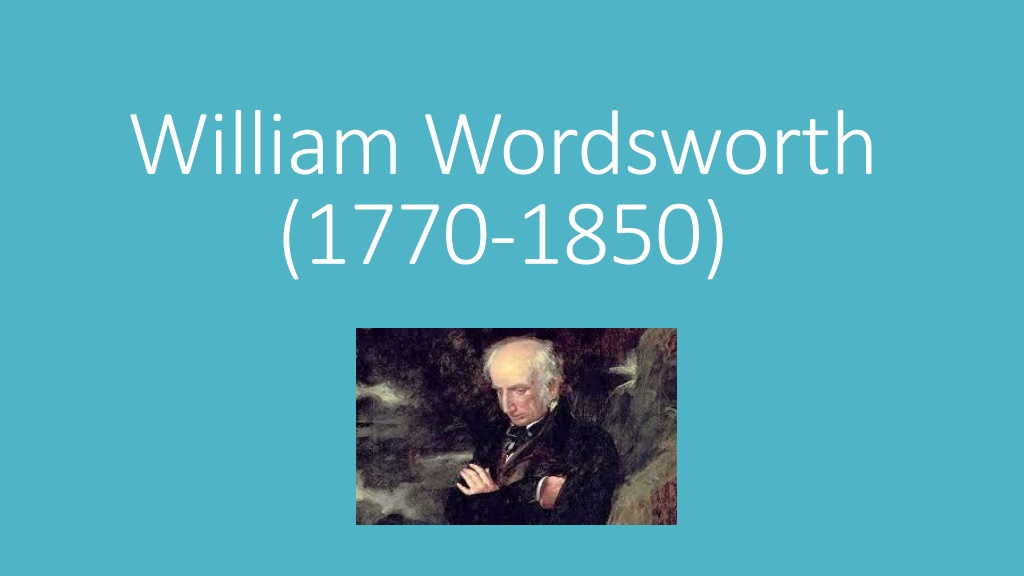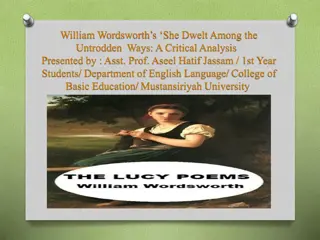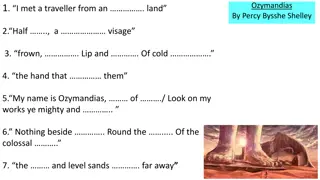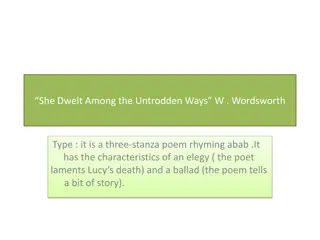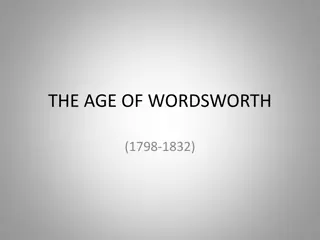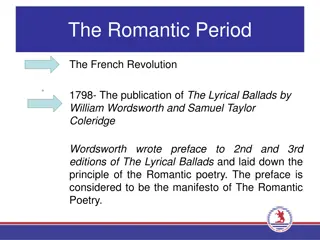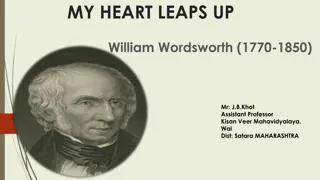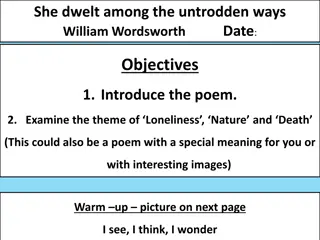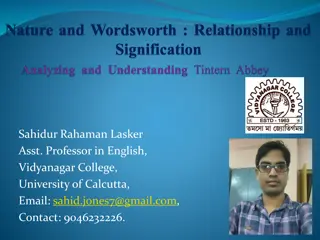William Wordsworth (1770-1850): Poet of Nature and Memory
William Wordsworth, a renowned English poet, was born in 1770 and his works were inspired by the landscapes of the Lake District. His collaboration with Coleridge in publishing "Lyrical Ballads" marked a significant moment in Romantic poetry. Wordsworth's emphasis on simplicity, nature, memory, and imagination shaped his poetic style. He celebrated ordinary people and everyday life, viewing poetry as the expression of genuine emotions recollected in tranquility. His reverence for nature as a source of inspiration and connection to the divine permeates his works.
Download Presentation

Please find below an Image/Link to download the presentation.
The content on the website is provided AS IS for your information and personal use only. It may not be sold, licensed, or shared on other websites without obtaining consent from the author. Download presentation by click this link. If you encounter any issues during the download, it is possible that the publisher has removed the file from their server.
E N D
Presentation Transcript
William Wordsworth (1770-1850)
William Wordsworth William Wordsworth was born in 1770 in Lockermouth, close to the Lake District, whose landscapes inspired many of his poems. He got his degree at Cambridge University and then he left for France; His initial enthusiasm for the ideals of the French Revolution turned into disillusionment because of the violent development of the French Republic 1794 he returned to England and he met Coleridge; together they published in 1798 the collection of poems entitled Lyrical Lyrical Ballads Ballads. The Wordsworth s Preface, contained in this work, was considered the Manifesto of Romantic Poetry. Wordsworth spent his last years in the Lake District writing and revising his works 1859 he died in Grasmere
Themesand style In his Preface to the Lyrical Ballads, Wordsworth outlines the programmatic points of his theory of poetry. Language= W. rejected the elaborate forms of Augustan poetry and claimed that the poet s language has to be simple and direct. Poet= The poet is portrayed as an ordinary man, endowed with an exceptional sensibility and enthusiasm for nature. The poet is a man speaking to men . He has to use a language really used by men to be a prophet and to talk about a low rustic life that is less under the influence of social vanity and where the elementary feelings germinate. Subjects= W. celebrates in his poems a new type of subject-matter: ordinary people and the everyday life; Poetry= Poetry is conceived as the result of a spontaneous overflow of emotions recollected in tranquility; in other words, poems are created from the memory memory of a previously experienced emotion.
Memory and Imagination Memory is the faculty through which adults can retrieve the joyous feelings of childhood. Memory is thus a source of poetry: a recollected emotion, if reworked by the poet s imagination imagination, can be transformed into verses capable of communicating the actual sensation of that original emotion. Memory Memory Imagination Imagination Inward Inward* * Eye Eye * * Subjective Subjective vision vision of the of the poet poet
Nature W. can be defined as a worshiper of Nature . In the Lyrical Ballads, he portrayed the natural world as a source of inspiration, beauty and delight. According to W., besides being a source of poetic inspiration, Nature provides man with numerous beneficial effects: -It comforts a perturbed mind; -It inspires elevated thoughts and passionate emotions; -It allows to connect with the divine principle immanent in everything created
Countryside ( industrial town) Nature Nature Source of inspiration and feelings of joy Pantheistic view (organic living whole imbued with spiritual life)
Childhood For W., childhood is a state of innocence and purity, an age in which human beings experience the most intense bond with Nature. Children are part of the natural world; through the sensations of joy, wonder and awe, they feel a strong connection with it. However, as they grow up into adulthood, most men are corrupted by social conventions. Only a few of them maintain their purity, their connection with Nature and their sensibility: poets, as well as humble people, such as peasants, farmers and shepherds, who live in closest contact with Nature.
